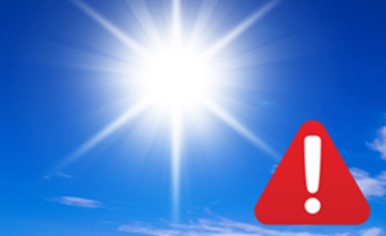Staying safe in the sun
Have fun in the sun but stay safe – that’s the message from George’s, Epsom and St Helier Hospitals Group as temperatures start to soar.
This weekend’s weather forecast looks more South of France than South London – with the mercury set to hit 29 degrees Celsius. Monday and Tuesday is set to be even hotter, pushing up into the 30s.
We want everyone to enjoy the warmer temperatures – but there are things you can do to stay well.
When the weather starts to get hotter, many people – especially those in high risk groups, such as elderly people, babies, young children, and those with heart, respiratory and serious health problems – can suffer from heat-related illnesses such as heat exhaustion, dehydration and sunburn.
But you can do the following to keep cool – and avoid a trip to one of our emergency departments:
- Look out for people who may struggle to keep cool and hydrated, such as elderly relatives or neighbours
- Keep windows closed when the room is cooler than outside, but open them at night when the temperatures has dropped
- Close curtains on rooms that face the sun to keep indoor spaces cooler and remember it may be cooler outdoors than indoors
- Drink plenty of fluids and avoid excess alcohol. Take water with you, if travelling
- Try to keep out of the sun between 11am and 3pm
- Stay in the shade
- Apply suncream regularly, and wear a hat
- Don’t exercise during the hottest parts of the day
- Have cool showers or baths, put a loose, cotton, damp cloth or scarf on the back of the neck, and spray or splash your face with cold water frequently to help keep your body cool.
Staying in the sun too long or prolonged exposure increases the risk of you becoming unwell.
Heat exhaustion is not serious and usually gets better when you cool down. But if this turns into heatstroke it needs to be treated as an emergency.
You can see a full list of symptoms here, but you may have heat exhaustion if you are experiencing the following:
- Headaches
- Dizziness
- Loss of appetite
- Feeling sick and confused
If you are affected by any of these symptoms, it is important to cool down as quickly as possible. Find out here how you can do this – and what you should do if your condition worsens.
To find out more about staying safe during hot weather, visit the NHS’s website.


